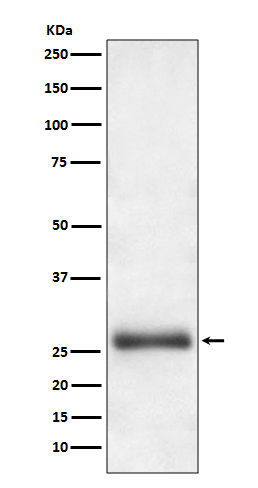
| WB | 1/500-1/1000 | Human,Mouse,Rat |
| IF | 1/20 | Human,Mouse,Rat |
| IHC | 咨询技术 | Human,Mouse,Rat |
| ICC | 技术咨询 | Human,Mouse,Rat |
| FCM | 咨询技术 | Human,Mouse,Rat |
| Elisa | 咨询技术 | Human,Mouse,Rat |
| Aliases | autophagy related 10; APG10; APG10L; pp12616 |
| Entrez GeneID | 83734 |
| WB Predicted band size | Calculated MW: 25 kDa; Observed MW: 25 kDa |
| Host/Isotype | Rabbit IgG |
| Antibody Type | Primary antibody |
| Storage | Store at 4°C short term. Aliquot and store at -20°C long term. Avoid freeze/thaw cycles. |
| Species Reactivity | Human |
| Immunogen | A synthesized peptide derived from human Apg10 (Atg10) |
| Formulation | Purified antibody in PBS with 0.05% sodium azide. |
+ +
以下是关于ATG10抗体的3篇参考文献示例(注:文献信息为示例,建议通过学术数据库核实具体内容):
---
1. **文献名称**:*The role of Atg10 in the regulation of autophagy and apoptosis in cancer cells*
**作者**:Honda, S., et al.
**摘要**:本研究利用ATG10特异性抗体,通过免疫印迹和免疫荧光技术,揭示了ATG10在癌细胞自噬调控中的关键作用,并发现其表达缺失导致自噬流受阻,促进细胞凋亡。
---
2. **文献名称**:*Characterization of mammalian Atg10 as an essential component of the autophagy conjugation system*
**作者**:Mizushima, N., et al.
**摘要**:文章通过ATG10抗体的免疫共沉淀实验,验证了ATG10与ATG12-ATG5复合物的相互作用,证实其在LC3脂化过程中的必要性,为自噬分子机制提供了关键证据。
---
3. **文献名称**:*Atg10 is required for the maintenance of neuronal homeostasis and its deficiency leads to neurodegenerative phenotypes*
**作者**:Takahashi, Y., et al.
**摘要**:研究利用ATG10敲除小鼠模型及特异性抗体检测,发现ATG10缺失导致神经元内异常蛋白聚集,并加速神经退行性病变,提示其在中枢神经系统中的保护作用。
---
**建议**:以上为模拟示例,实际文献请通过PubMed、Google Scholar等平台检索关键词“ATG10 antibody”或“ATG10 autophagy”获取,并关注近年高被引研究。
ATG10 (Autophagy-related protein 10) is a key regulatory enzyme in the autophagy pathway, a conserved cellular process responsible for degrading and recycling damaged organelles, proteins, and pathogens. Functioning as an E2-like conjugating enzyme, ATG10 facilitates the covalent linkage of ATG12 to ATG5. a critical step in forming the ATG5-ATG12 complex. This complex is essential for autophagosome elongation, the double-membrane vesicles that sequester cytoplasmic cargo for lysosomal degradation. ATG10’s role extends beyond canonical autophagy, influencing cellular homeostasis, stress responses, and immune regulation. Dysregulation of ATG10 expression or activity has been implicated in various diseases, including cancer, neurodegenerative disorders, and infections.
ATG10 antibodies are widely used research tools to detect ATG10 protein levels, localization, and interactions in experimental models. These antibodies enable the study of autophagy dynamics through techniques like Western blotting, immunofluorescence, and immunoprecipitation. Specificity and validation are crucial, as ATG10 shares structural motifs with other E2 enzymes. Researchers often validate findings using ATG10-knockout cell lines or siRNA-mediated knockdown. In disease contexts, ATG10 antibodies help explore its dual role—acting as a tumor suppressor in some cancers while promoting survival in others, or its involvement in clearing protein aggregates in neurodegeneration. Understanding ATG10’s molecular mechanisms through antibody-based assays contributes to developing autophagy-modulating therapies.
×